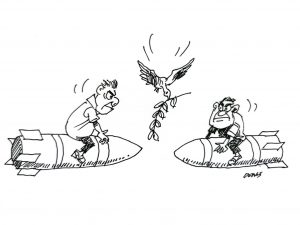We now live in an era when, as regards international relations, countries should exercise prudence and self-control in the face of conflicts with other nations knowing that armed clashes nowadays have become far devastating to lives and properties, hence the need to prioritize diplomacy and give peace a chance.
As we all know, the advancement of weaponry and technology has made armed conflicts more destructive than ever before, underscoring the urgent need for restraint and thoughtful decision-making in times of tension. Countries in conflict with others should avoid hasty decisions in resorting to armed confrontation in hopes of resolving conflicts.
The destructive power of modern weaponry has raised the stakes in any conflict between nations. With the capacity to cause widespread devastation and loss of innocent lives, the consequences of military confrontations are far-reaching and long-lasting. Countries must recognize the futility of resorting to violence as a means of resolving disputes and instead embrace dialogue and negotiation as the primary tools for conflict resolution. Diplomacy not only saves lives but also paves the way for sustainable peace and cooperation in the long term.
Moreover, the interconnected nature of the global community means that the repercussions of armed conflicts extend beyond national borders. Economic stability, regional security, and humanitarian crises are just some of the ripple effects that can result from a single act of aggression. Countries should contribute instead to a more stable and harmonious world order, where mutual respect and understanding form the basis of international relations.
It is crucial for nations to recognize that the true measure of strength lies in the ability to exercise restraint and seek peaceful solutions to conflicts. History has shown time and again that wars only breed further animosity and suffering, leading to a cycle of violence that is difficult to break. By choosing the path of diplomacy and dialogue, countries demonstrate their commitment to upholding the values of peace, cooperation, and respect for human life.
By maximizing diplomacy and giving peace a chance, nations can avert the catastrophic consequences of armed clashes and pave the way for a more peaceful and prosperous future for all. Through mutual understanding, respect, and a commitment to peaceful coexistence, we can build a world where conflicts are resolved through dialogue and cooperation, rather than violence and destruction.




